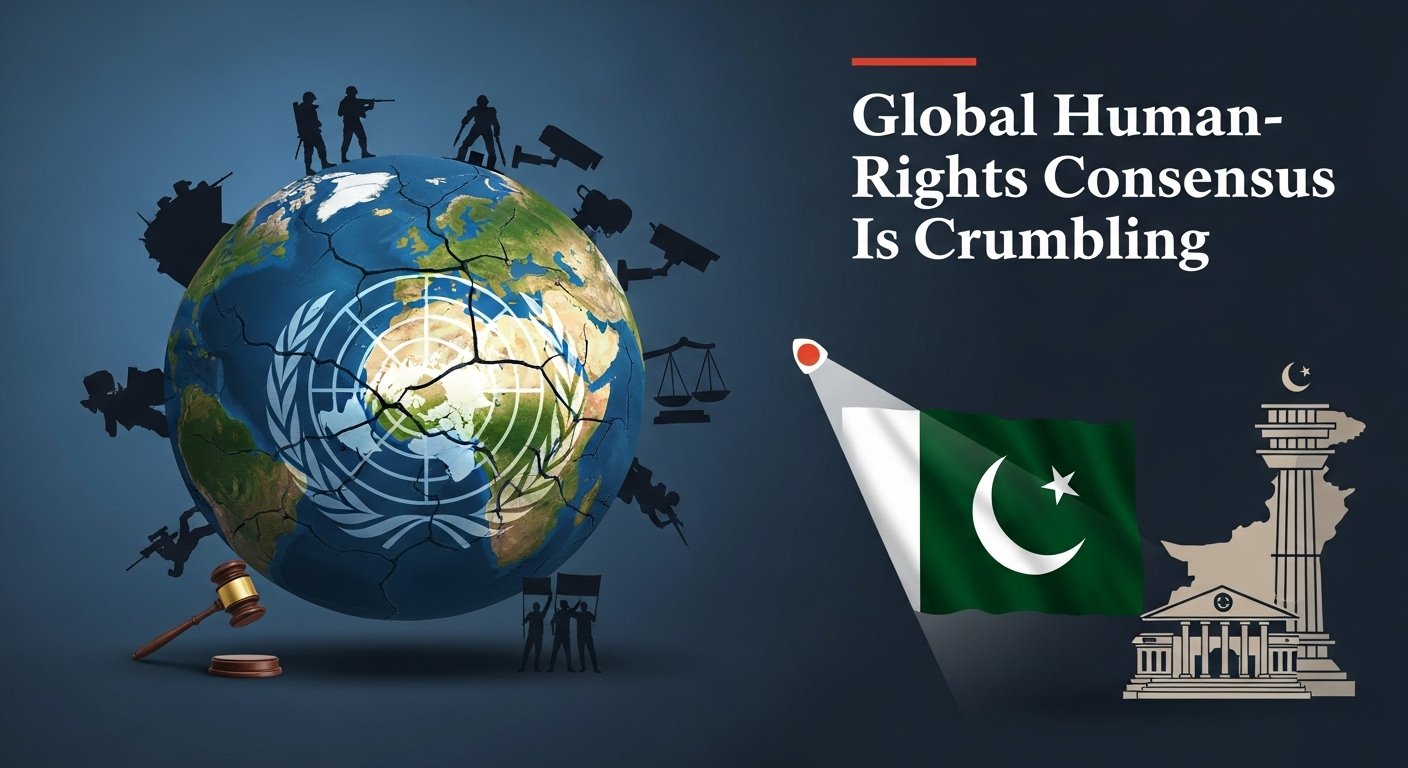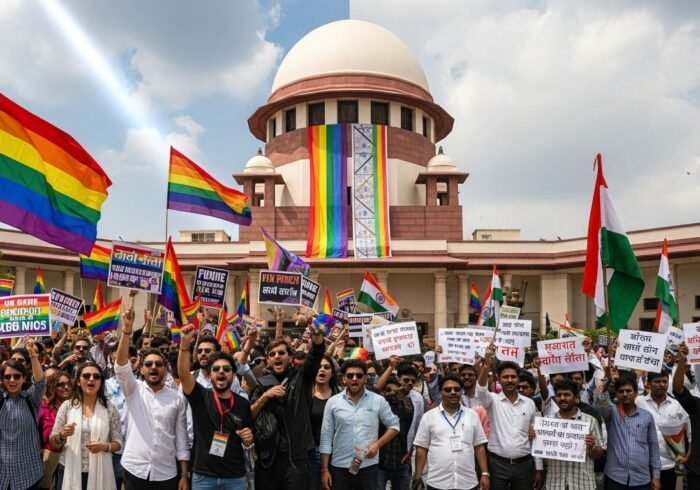The Global Human-Rights Consensus Is Crumbling — What That Means for Pakistan
By 5th Column
Introduction — a warning from Geneva
“The global consensus on human rights is crumbling under the weight of authoritarians, strongmen and oligarchs,” United Nations High Commissioner for Human Rights Volker Türk told the Human Rights Council earlier this year — a blunt diagnosis that has since reverberated through capitals and civil-society networks. The warning is not rhetorical: it points to a growing pattern of selective enforcement, shrinking civic space, geopolitical double standards, and weakened multilateral capacity to prevent mass atrocities. Reuters
What “crumbling” looks like — five concrete trends
-
Selective accountability and geopolitical fracture
Powerful states increasingly pick and choose which abuses to condemn. Diplomacy and pressure often reflect strategic priorities rather than a consistent human-rights rulebook. Even within UN bodies, lobbying and withdrawal from processes have shifted the balance, weakening the universal moral authority those institutions once wielded. Reuters reporting on diplomatic pressures at the UN Human Rights Council makes this pattern clear. Reuters -
Worse abuses in conflict zones with weak response
Recent UN investigations document systematic torture and ill-treatment in multiple conflicts — for example, verified reports of systematic torture of Ukrainian civilians in detention facilities, compiled during ongoing investigations. These cases reveal that when state or occupying forces act with impunity, multilateral response mechanisms are slow and politically contested. Reuters -
Resource squeeze on international monitoring
The office that documents abuses globally (OHCHR) is chronically underfunded even as crises multiply. The UN rights office’s 2025 funding appeal underlined that gaps in funding undermine monitoring and early-warning efforts — and so reduce the international community’s ability to act before violations escalate. Reuters -
Shrinking civic space and domestic repression
Governments of various stripes have tightened laws on NGOs, media, and digital platforms in the name of security or public order. That narrowing of civic space makes independent reporting, legal defence, and public mobilisation far harder — with long-term consequences for accountability and social cohesion. -
Digital tools amplifying surveillance and disinformation
Technologies that might expand participation are also being used for surveillance, identity profiling, and the spread of targeted disinformation. When states exploit these tools, civic trust erodes and minorities face new, technically mediated risks.
Why this matters for smaller, vulnerable states — and for Pakistan
A fraying global consensus does not only harm faraway populations; it changes the rules for every state. When international institutions are weakened, the diplomatic toolkit for protecting civilians, contesting abuses, or pressing for fair treatment shrinks — and geopolitical competition fills the vacuum.
For Pakistan, the stakes are twofold:
-
Practical risk: Reduced capacity of multilateral institutions makes coordinated responses to crises (refugee flows, cross-border violence, climate displacement) harder to mount. Pakistan — which already hosts large refugee communities and faces climate shocks — stands to lose diplomatic space to negotiate international support when the system is fragmented.
-
Narrative and fairness: Pakistan has long emphasised that human-rights norms must be applied consistently, without political selectivity or double standards. The present trends validate that concern: international outrage often depends on headlines and geostrategic calculations, not only on principle.
Pakistan’s position — honest appraisal and selective strengths
Pakistan’s human-rights record is imperfect, and independent watchdogs rightly press for improvements. Domestic civil-society reports and the Human Rights Commission of Pakistan document serious challenges — including issues of minority protection, enforced disappearances, and gender-based violence — and call for stronger implementation and transparency. HRCP
At the same time, Pakistan has institutional frameworks and tangible initiatives that show constructive engagement rather than isolation. The National Commission for Human Rights published an Annual Report in 2024 documenting work on protection, legal reform, and rights promotion — indicating the country’s official channels for redress and reform. The government’s Ministry of Human Rights also publishes policy materials and program updates showing areas of active work. NCHR Pakistan+1
Two further points matter for a balanced Pakistan-forward reading:
-
Sovereignty plus constructive engagement: Pakistan’s stance at the UN and other forums consistently argues that human-rights promotion must respect national sovereignty and development priorities. That position is not an argument against rights; it is a plea for predictable, fair, and non-selective application of norms.
-
Domestic capacity building: Pakistan’s priorities should be practical: strengthen judicial independence, resource national human-rights bodies, scale up legal aid, and invest in public-health and education measures that deliver rights in practice rather than only paper commitments.
What Pakistan (and like-minded states) can reasonably demand and do
-
Demand consistent multilateralism. Push for rules and procedures at the UN that reduce selective pressure and increase transparency in how human-rights inquiries are opened and funded. This means advocating for fully funded, depoliticised investigative mechanisms. Reuters
-
Invest in national institutions. Strengthen the independence and budgets of national human-rights institutions (NCHR), ombuds offices, and legal aid clinics so that citizens can seek redress at home. Pakistan’s recent NCHR reporting shows the institution can play a constructive role when resourced. NCHR Pakistan
-
Protect civic space while tackling genuine threats. Security laws should not be a catch-all that muzzles dissent. Pakistan must craft legislation that targets real security risks while preserving the operational space of NGOs, media, and lawyers.
-
Lead by example on selective areas. Pakistan can amplify positive domestic reforms — for example, public-health campaigns and women’s outreach programs — to rebut simplistic narratives and show rights can be advanced within local contexts.
-
Forge regional approaches. When global consensus is weak, regional coalitions can preserve norms. Pakistan should engage regionally (SAARC, OIC, bilateral channels) to agree on practical human-rights cooperation that respects cultural contexts but protects universal minimums (e.g., protection from torture, minority rights).
Conclusion — principled realism, not retreat
The UN rights chief’s alarm is a call to action: the erosion of the global human-rights consensus hurts everyone, but it also creates an opening for states like Pakistan to argue for a fairer, less politicised multilateralism. That argument should not be an excuse for inaction at home. To be credible, Pakistan must press for even application of norms at the international level and deliver measurable improvements domestically — stronger institutions, clearer protections, and transparent, rights-based policymaking.
If the world’s human-rights architecture is to survive, it will need both global solidarity and honest national reform — and Pakistan can be a voice for both.





